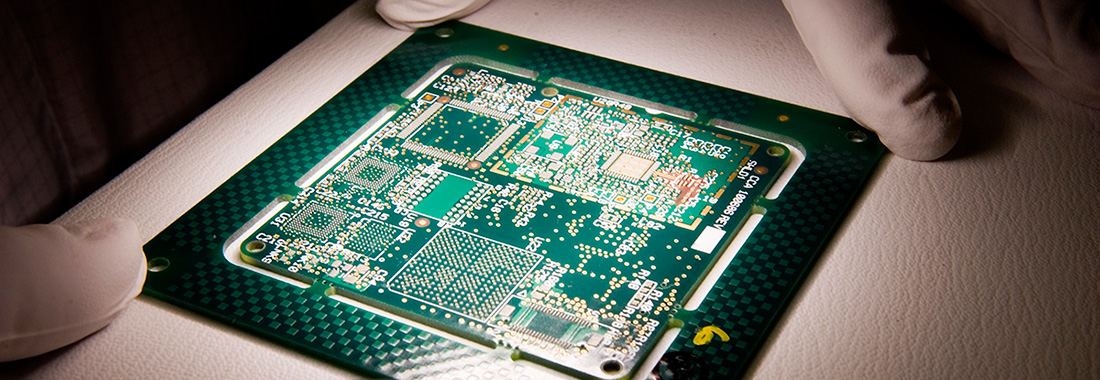Electronics & Sensors

Nanocomposites of Quantum Dots in Polymer Matrices, and Method of Making Same(RFT 697)
This technology enables the in situ synthesis of uniformly dispersed quantum dots within polymer matrices, with precise control over their size, band gap energy, and spatial distribution.
View this Technology >
Solar energy power conversion system (RFT 637)
Researchers at North Dakota State University have developed an innovative solar energy power conversion system. The system is designed to be easily connected to the power grid through a series of inverters and controllers, facilitating the utilization of the electrical energy produced.
View this Technology >
Novel technique and apparatus for detection and quantification of biomolecules in body fluids (RFT-553)
Scientists at NDSU have developed a novel technique and device to quantify and detect low abundance biomolecules in patient samples. This technique is useful in point-of-care, cancer screening settings. The apparatus itself is compact and compatible with available imaging technologies.
View this Technology >
Rapid, On-Site, Viral Vector-Free Car T-Cell Manufacturing Gives Faster Production of Higher Quality Cell Population (RFT-538)
Scientists at NDSU have developed a small device for improved CAR T cell production, which speeds the turnaround time by enabling CAR T cell production 'on-site' at a hospital or cancer clinic. This simple, microfluidic device is easy to make and use, with an automated transfection process that takes about one hour.
View this Technology >
Photoinitiators that Trigger Extremely Rapid and Efficient Polymer Synthesis using UV or Visible Light (RFT-530)
NDSU researchers have developed a range of Type I, Type II, and acidic photoinitiators, which provide polymerization of polyacrylate with good efficiency at low concentrations. The synthesis of photoinitiators is efficient using routine chemistry, and their structures are easily manipulated to tune for low energy (including visible) light wavelengths. These photoinitiators are each triggered by a very narrow and easily defined wavelength, making the timing of polymerization easy to control (and avoiding the inadvertent triggering of the reaction). The photoinitiators may be produced from either bio-based or petroleum-based starting materials, including such readily available materials as vanillin.
View this Technology >
Roll-to-Roll Synthesis of Silicon Thin Films from Liquid Silanes (RFT-447)
Researchers at NDSU have developed a process to synthesize silicon thin films from liquid hydrosilane (Si6H12) at ambient pressure in a roll-to-roll method using atmospheric pressure aerosol-assisted chemical vapor deposition (AA-APCVD) that has higher deposition rates compared to the state-of-the-art PECVD. Solubility of solid dopants in the liquid hydrosilane facilitates the deposition of degenerately doped (n & p-type) Si thin films as opposed to compressed toxic phosphine and borane gases used in other techniques. Liquid hydrosilane compositions consisting of nanomaterials enable hybrid Si films with embedded nanomaterials that have applications in energy harvesting and light-emitting devices.
View this Technology >
Biodegradable Soil Sensors that can be "Planted" with a Seed Mixture (RFT-428)
Scientists working at NDSU are developing biodegradable sensors capable of directly monitoring and reporting the soil environment in which they are placed. The sensors are constructed by using NDSU’s patent-pending “direct write” electronic printing techniques to print circuit and antenna patterns directly onto renewable, bio-based materials. The circuit patterns are printed with trace amounts of metallic materials such as aluminum that are safe for the soil when the sensors naturally biodegrade over time.
View this Technology >
Contactless Laser-Assisted Placement of Discrete Electronic Components (RFT-370)
Scientists working at North Dakota State University (NDSU) have discovered a method for the contactless laser-assisted assembly of discrete components such as ultra-thin, ultra-small semiconductor dies and MEMS components onto rigid and flexible substrates. Laser-direct writes techniques are an enabling technology for the ever-decreasing scale of microelectronic devices. Specifically, Laser-Induced Forward Transfer (LIFT) techniques show promise as a disruptive technology that will enable the placement of components smaller than what conventional pick-and-place techniques are capable of today. NDSU’s Thermo-Mechanical Selective Laser-Assisted Die Transfer (tmSLADT) process is an application of the unique blistering behavior of polyimide film when irradiated by low-energy focused ultraviolet laser pulses. The tmSLADT process has the potential to take its place as the next-generation LIFT technique, with distinct advantages over previously studied ablative and thermal releasing techniques. Experimental results studying transfer precision indicate this non-optimized die transfer process compares with and may exceed, the placement precision of current assembly techniques.
View this Technology >
Electrospinning Process and Compositions for High Volume Silicon Nanowire Production (RFT-311)
Scientists at North Dakota State University (NDSU) have developed a process for continuous high-volume production of silicon micro-and nano-wires based on electrospinning. The technology is based on the ability to use liquid silane as a starting material, so the length of the wires is essentially unlimited. The wires can be produced with a variety of polymers, metal particles, and silane variations to generate a range of properties and capabilities. Potential applications include composite materials, electronic devices, sensors, photodetectors, batteries, ultracapacitors, and photosensitive substrates.
View this Technology >